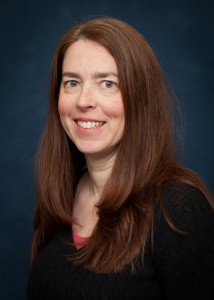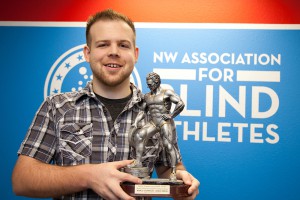Fall 2014 Classified Staff Excellence Award
Congratulations to Heather White, recipient of the 2014 Fall Quarter Classified Staff Excellence Award! The following is taken from her award nomination:
Heather White is the Program Support Supervisor for Disability Support Services. She has been with the college since 2002.
Heather provides a tremendous service to the community by facilitating communication between hearing and deaf consumers. Heather interprets and provides accessibility for campus events professionally and holds herself to the high standards of skill that she expects from all of her interpreters. Her performance in her work is the very definition of “excellence.”
Heather always has a great attitude. She is compassionate to everyone who comes in seeking help. She takes the time to know the specific needs of the deaf students and the interpreters, and matches the student’s needs with the interpreter’s strengths. What is important to the student is important to Heather.
Heather works to improve our community in many ways. She is involved with the Sign Language Interpreter Program Advisory Committee at Portland Community College and is on the Washington School for the Deaf Post High School Advisory Committee as well as the State Deaf Transfer Fair Local Advisory Committee. She is also on the Commencement committee and provides the interpretation at Commencement to make it accessible to deaf students, faculty, staff and audience members. She has taken on the role of placing interpreters for Washington State University Vancouver and Lower Columbia College.
Heather is a wonderful person to work with and for. Whether someone is a new or veteran interpreter, she makes sure we all feel respected and supported. She always listens actively and attentively and looks at each person as an individual.
Congratulations to all of the fall quarter nominees:
Vanessa Meyer: Vanessa is doing a great job in the department. She pays attention to details and maintains the office and its immediate environment, including the mailroom, elegantly. Vanessa is cheerful, polite and shows courtesy to the faculty. When help is needed, she takes prompt action. Her messages are clear and precise. Everything she does is orderly.
Susan Taylor: Susan is in charge of all admissions at Clark International Programs and she always manages to get everything in order to perfection. She wants to help every person she comes in contact with. Whether it is a student or a co-worker or someone outside of our campus, she is willing to take all the time needed to make you feel comfortable and confident. Susan respects everyone. She is always the bigger person and is always polite, no matter what the situation.
Thor Tesdale: Thor works tirelessly to maintain the interior and exterior appearance of the college. He takes great pride in his work and makes sure the job is completed to satisfaction and on time. Thor prioritizes jobs so that the most pressing deadlines are met first. He is very personable and is willing to “bend” his schedule as much as possible to accommodate the needs of other individuals. Thor’s calm and respectful personality is a beneficial addition to Facilities Services. The personal thank-you notes he has received are additional evidence of his high level of service.
The College Community will celebrate all 2014-2015 nominees and recipients at the Annual Ice Cream Social.
The Classified Staff Excellence Award was established in 2005 and recognizes classified staff who have demonstrated exemplary work performance, outstanding customer service, a positive and cooperative spirit, and special achievements or contributions to the college community. Thanks to the support of the Clark College Foundation, each quarter’s recipient receives a $400 cash award.


